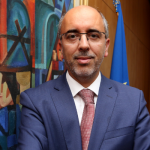Covid-19 – a game changer in education?
There is no doubt that the Covid-19 pandemic has changed the ballpark for nearly every business sector, not least private education. Essential Business talks to Miguel Santos, Board President of the International Sharing School at Tagus Park, Oeiras on the challenges of teaching during the coronavirus pandemic.
The International Sharing School, which prides itself on an international multilingual education based on sharing and respecting multicultural values through an International Baccalaureate (IB) curriculum has, like many other businesses, been forced to embrace the changes and challenges thrown up by the current Covid-19 pandemic. Business has had to be as usual, or as near to it as possible in what, for everyone, is a highly unusual once in a lifetime event.
“We weren’t ready for this crisis, I think most people weren’t, but a week before the Government announcement that schools would close, we realised there would be a nationwide shutdown and had already been looking at ways that we could maintain educational activities and the running of the school remotely” says ISS President Miguel Santos.
Santos explains that at first they realised that they were in unchartered territory and that there wasn’t a roadmap of contingencies for a situation as unexpected as Covid-19 and which had so many far reaching and potentially catastrophic consequences on business and society.
“We found a solution, which was remote classroom teaching through the platform Zoom. We implemented it, stuck with it and adapted it on the hoof” he explains, adding that some aspects worked, others didn’t, and so it was huge learning curve for the administration, teachers, parents and children at the school which has two campuses, one in Funchal, Madeira and the other at Tagus Park, Oeiras near Lisbon.
The first step was a short 2-hour period of training for the teaching staff on how to use the technology, and the following day the school began working in what he calls “hybrid mode”.
“We gave parents the option for their children to attend school or partake in the classes remotely at home with livestream lessons. Our idea was that through the hybrid system we would learn as we went along, see how effective the model was, adapt the model where necessary, and then adopt a 100% online steaming system” explains Santos.
The system ran so well that on Thursday 12 March the decision was made to shut down the physical school and open the virtual school the following day.
“Since then we have been working around it, trying to familiarise ourselves with the platform, but also the teaching systems and ways that classroom teaching is conducted under these new circumstances. For the first week we retained the normal lesson timetable, but then realised we had to adapt it for online use because the lessons, which are of a 40-minute duration, vary in intensity and so we don’t serve the same content that we would under normal circumstances” says the ISS board president.
The challenge of technology
The first challenge the school’s administration came up against was some resistance in using the technology. “Not everybody is as tech savvy as one would expect, especially when dealing with young children” he muses.
“We had some teething problems with connectivity, but surprisingly distance learning went well, although in a family with several children there are sometimes problems because they didn’t have enough laptops or computers at home” says Santos.
“The other issue is teaching very young children remotely, getting them to concentrate for long enough in order to transmit the content” he explains.
The school had to redesign the timetables, with shorter lessons and screen time because it can be more stressful for young people to spend a long time in front of a computer.
The ISS president says that in the shorter 40 minute lessons, 20 minutes are devoted to teaching content, while in the other 20 minutes the teacher focuses on the students one-on-one. Typically, under normal circumstances, the school has around 12 pupils per class in a school that currently has 209 in Oeiras and 170 in Funchal.
Under pressure
Santos stresses that the teachers have been working extremely well and the adaptation was “incredible”. “We knew that it would work, but weren’t expecting such a great response and for it to run as smoothly as it did” he admits, adding that the planning can be more extreme, while following up pupils can prove a bit harsh on the teachers at times, who he says are under pressure.
To deal with the added stress that both children and teachers are facing, the International Sharing School has a Special Education Needs Department and two psychologists on hand who help by using stress reducing methods, and who generally are on call to support teachers, parents and children through online events such as a recent webinar on ‘Dealing with Anxiety due to Social Isolation’.
This is important, as parents often want to know how they can avoid passing on their own stress and frustrations onto their children as a result of spending so much time confined at home.
And because tension and stress can often be relieved by an exercising, the physical education staff have been organising regular online workouts which benefit both the children and their parents.
Kids will be kids
One thing that never changes, irrespective of generations and the slings and arrows of outrageous fortune, is human nature, particularly the timeless tendency of kids to mess around in classrooms.
The pandemic doesn’t seem to have altered this, although being at home under the watchful eyes of parents has, to a certain extent, tempered the urge to be naughty in the absence of other young willing accomplices.
“Some of them have cottoned on to the fact they can change the backgrounds on Zoom with funny images and writing silly jokes in the chatroom and so on, but we’ve tried to contain it as much as possible with online rules and procedures, but then kids will be kids and at least they are creative and we laugh it off” he says grinning.
Much of this fooling around has to do with attention and concentration spans which tend to be of around 20 minutes in the classroom, and the school has, overall, a policy of breaking a period up into parcels of time and ensuring that the kids don’t stay sat down for too long without little breaks between classes.
“Right now we’re doing the same as we would normally, but only virtually, with games that everyone can join in, including online platform quizzes, all aimed at making it a fun educational experience, while taking out the stress and intensity of the new reality of learning from home” Santos explains.
Looking to the future
Distance learning may well become a feature for private schools from now on, particularly international ones, where it might be more convenient for overseas parents to opt for distance learning at times when their children are abroad and not in Portugal.
“Platforms like Zoom have actually been around for a long time, we’ve had Skype and Facetime and Microsoft Teams that many people had in their Windows package but may never have thought to use it because most didn’t need to” says Santos
“But after the quarantine is over, I think that everyone will be more familiar with these tools and use them more when convenient for meetings, webinars and on-line socialising, and this will bring a lot of opportunities for companies and schools which have gone through the crisis,” concludes the board president of the International Sharing School.










